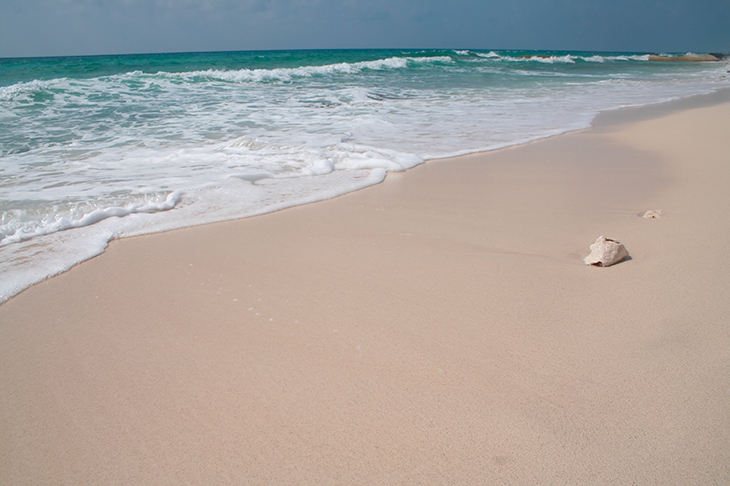The other week I turned up for the village walking club’s Monday hike. A dawn meet. Two cars. A 90-minute drive and we parked on beaten earth under umbrella pines. The line-up that day was three English, three French. I was the youngest; the others were encumbered by walking poles. We shouldered our day packs and skied through the pines to emerge on a dazzling beach next to a glittering sea. A hundred metres offshore was a steep fortified island. Fort de Brégançon is the French President’s summer residence, they said.
A spry and taciturn old Frenchwoman, dressed for any future meteorological possibility and with a whistle and lanyard strung around her neck, had assumed, I now noticed, a surprisingly well-defined role as leader, guide and timekeeper. She reluctantly allowed the group 30 seconds’ contemplation of the presidential summer house, then set off resolutely towards the west and we followed in an attenuated line.
When I first came to the South of France, the blue motorway road signs pointing the way to places with names such as Nice, Cannes, Saint-Tropez, Monaco and Menton shimmered glamorously in the mind. Passing beneath them I used to think, ‘This is living.’ But the sprawling concrete reality, when I went there, was either hideous or exclusive or both. Often when we went down to the sea we’d say to each other, ‘It must have been lovely here before the war. Now look at it.’ Or, stuck in traffic on a hot day: ‘Blimey, let’s get out of here.’
As we traipsed along the shoreline, each successive beach seemed wilder and more beautiful than the last
Leaving Fort Brégançon (midway on a map between Le Lavandou and Hyères) behind us, le chef led us over and around a succession of wild headlands and scalloped unspoiled beaches: Devil’s Point, Mother of God Point and Cap Léoube; and in between les plages of Cabasson, Grand Jardin, Estagnol, Patelin, Pellegrin and L’Argentière — where the hideousness resumes. Twelve kilometres. Have a look on Google Earth. The land is owned by Lord Bamford, hereditary chairman of JCB, who is patently as opposed to unbridled coastal development as the most reactionary environmentalist could possibly hope for.
And unlike the soulless grey boulders or mud-brown sand that passes for a beach elsewhere along that coastline, the beaches here are of fine white sand. Moreover, when I looked down from the first low headland into the sea, I was reminded of Graham Greene’s memorable assessment of Evelyn Waugh’s prose, which was, he said, ‘like the Mediterranean before the war: so clear you could see to the bottom’. On the day I went, it was like that still. White sand, pellucid sea. Shut one eye and you could be on a deserted Caribbean island. I was so surprised.
As we traipsed along the shoreline beside the lapping wavelets, each successive beach seemed wilder and more beautiful than the last. On the half-mile white crescent of Pellegrin beach I speeded up to take my place alongside le chef to thank her for bringing us here and sharing what was surely a closely kept secret. ‘I’ve known worse places,’ she said curtly. After that I fell back to walk alone and savour the inward excitement of my discovery.
And something else.
When I was 11, my father drove us from Essex to the South of France in his Vauxhall Cresta. It was the summer of 1968 and we had to descend via Switzerland because in France the petrol stations were closed by strike action. It was my first time abroad. My father and his first cousin Rex had rented a villa at Le Lavandou. We spent the fortnight exploring the beaches east and west of it. I’ve always been a slow developer and 11 years old was, I think, when I first came to full consciousness. These deserted white beaches and that soft sea grass and that clear warm sea are pretty much my first continuous vivid memory.
I remembered a solitary French boy of about my age on one of these beaches. I went up to him and asked, ‘Parlez-vous anglais?’ He said, ‘Non.’ And that was that. But I was pleased. I had conversed with a foreigner in his own tongue. The French I had been taught in the last year of primary school by Mrs Burns hadn’t been an elaborate hoax after all.
And something else.
All my life I have rather despised my own and other people’s nostalgic narratives. This month I’m wallowing in them. Exile and a sad death and this pandemic hiatus are mostly to blame in my case, I think. And that day, on those white beaches beside a clear sea, an 11-year-old boy’s heart beat in mine. Coming in through the front door to our cave in the hills later that evening, I felt as though I had returned not from a day’s coastal hike but from revisiting myself as a child. Strange. Pleasant too. I must be slipping.







Comments